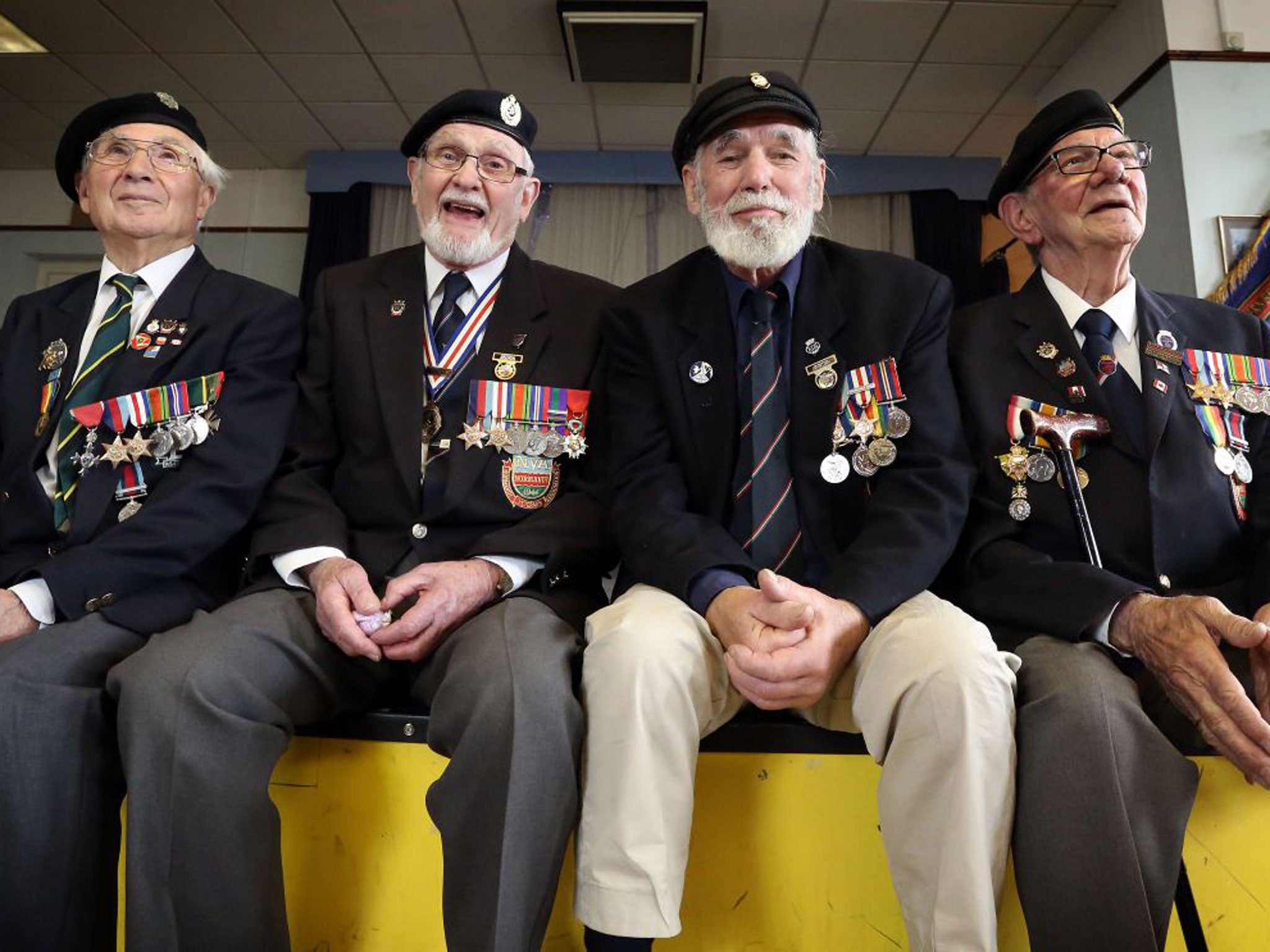Normandy Voices: 'We must cherish D-Day veterans while we can. They can teach us so much'
Terri Judd watches a group of men of who stormed the beaches at Normandy relive their memories as part of a project to make sure we never forget

His fingers surprisingly steady for a 91-year-old, Ian Hammerton reached into the pocket of his navy blazer adorned with medals and pulled out a notebook. Inscribed on the first page in neat black ink were 11 names.
One-by-one he pointed to each name and related their story: the brand new 2nd Lieutenant killed by a shell, the sergeant hit by anti-tank fire, the gunner who died alongside him. Periodically, he would pause, his eyes soulful as he stared back in time.
Almost seven decades after they perished, the memories of these young men remain vivid in the former Captain’s mind but he knows that it is time to pass on those recollections. Among Mr Hammerton’s treasured collection of magazine cuttings from 1944 is a photograph from which an 18-year-old soldier beams cheekily. “Alfie died earlier this year,” he explained.
Ten years ago the Normandy Veterans’ Association (NVA) had 9,000 members; today there are just 600. With the number of D-Day veterans dwindling at an alarming rate, the NVA is attempting to capture their memories on film for posterity. With the support of The Independent, they hope to raise enough funds to create hours of footage which will be passed on to a museum. Clips will be made into a box set of DVDs to mark next year’s 70th anniversary of one of the most pivotal battles of the Second World War.
Today, the first faces to be captured on screen gathered at the Conservative Club in Dartford, Kent. Frail old men reliant on walking sticks, the medals on their chests bearing testament to youthful valour, stood in silence before uttering in unison: “We shall remember them.”
It was a fitting start to a project that will attempt to ensure that those who never came home as well as those who survived are not allowed to fade into obscurity. “It seems poignant they never did this for the 1914 fellows. I am glad they are doing it for the Second World War ones,” said Royal Marine Cyril Simms. The 88-year-old added: “It might be of some interest in the years to come.”
“It is extremely important. We won’t be around much longer,” said Mr Hammerton. He was a Lieutenant with 22nd Dragoons when he landed on Juno beach on D-Day, commanding flail tanks with a boom and chains to detonate mines and clear a path.
“I can’t tell you if we were fired on. I was busy concentrating on making a gap to get off the beach,” he said in the matter-of-fact tone characteristic of so many of the veterans.
They sat in front of the camera yesterday to be interviewed by retired Brigadier Clive Elderton. Acts of bravery were brushed off with jokes and they consistently played down their own achievements. Only the memories of lost colleagues pierced the bravado. Their voices shook as they recalled the terrible losses.
Mr Simms was manning a gun on a landing craft on 6 June 1944, when the ships began to fire: “At dawn I can remember looking back and you couldn’t see the horizon for ships. It was quite exciting. I don’t remember really being afraid – apprehensive perhaps. The noise was terrific. It was like a giant roar, one continuous roar.”
Close to Juno Beach, he could see Canadian and British troops being cut down by a hail of bullets: “You could see the machine-gun fire and see them fall.” He brushed aside talk of his own injury when his ship was shelled, pointing out that two marines were killed. “That was the biggest downer,” he said. “After the war you make an effort to forget.”
Andrew Elmslie plans to cross the country, visiting the 30 NVA branches, to capture the memories on film. It is vital, he explained, to catch the words of the ordinary soldier, sailor or airman, not just the few that have featured in documentaries. For Major Mandy Reynolds, a padre at 36 Engineer Regiment and the daughter of the D-Day veteran, Royal Artillery Sergeant Major Sydney Whiting, the project comes too late. She tried to have his memories filmed shortly before he died but he was too frail. She said yesterday: “We have to cherish these men whilst we have got them. We can learn so much from them.”
That’s why The Independent, alongside the Normandy Veterans Association, is launching an appeal to ensure that the voices of the surviving veterans – the survivors of the survivors - are not lost to future generations. Click here for more information and to donate.
Join our commenting forum
Join thought-provoking conversations, follow other Independent readers and see their replies
Comments
Bookmark popover
Removed from bookmarks